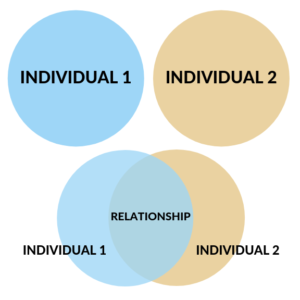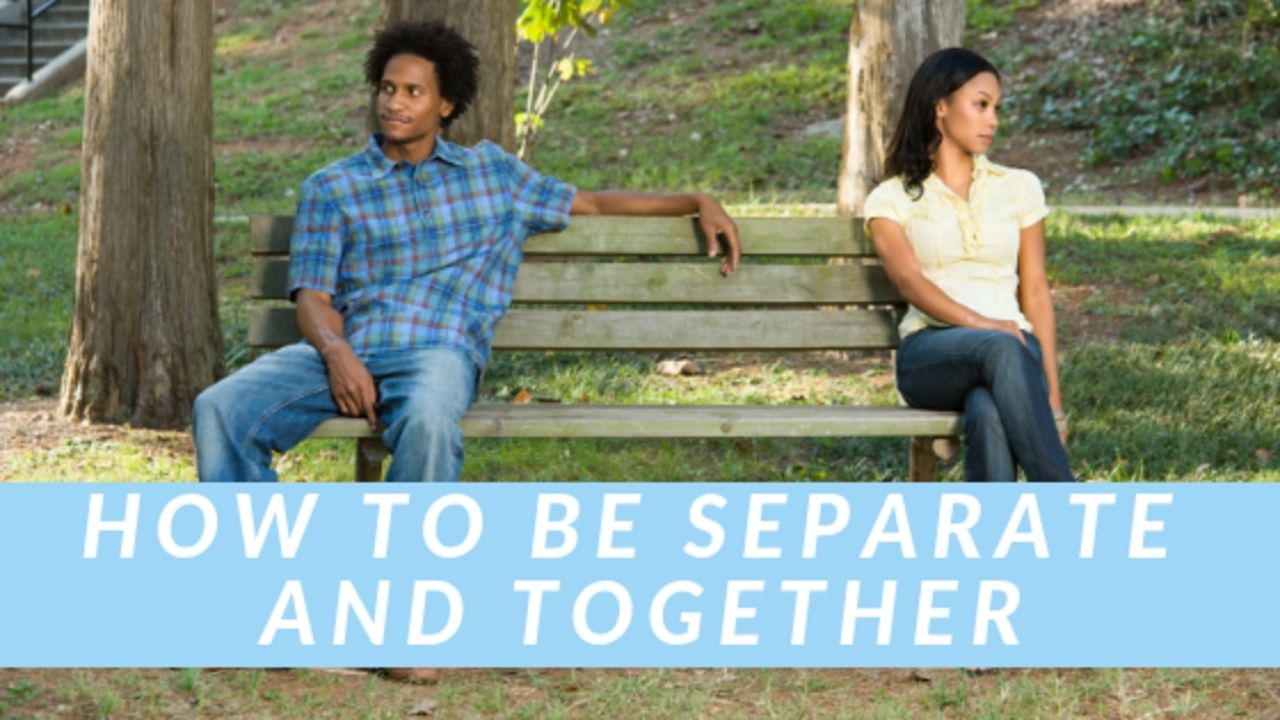Introduction
People are always asking me “How can I can make room for both my needs and my partner’s needs in our relationship?“ They go on to say that, more often than not, one or the other gets their way, which inevitably leads to resentments.
What they are really asking me is “How do we create a feeling of mutuality without undermining our own needs?“
The fact that 50% of first marriages end in divorce tells us, as if we didn’t already know, that relationships are hard work. They can be messy and exasperating, monotonous and heartbreaking – as well as joyful, exhilarating and self-affirming.
Is there a way that fewer people end up as casualties of marriages built on top of landmines?
Is there a way to create a romantic relationship where each person’s views and opinions are equally valued and equally respected and together they develop a healthy “we?”
Yours, Mine, Ours: Relationships Done Right
It Takes Three to Make a Relationship

All relationships are made up of three, not two, distinct entities – two individuals (I, you) and the life they share between them (we). A healthy relationship cannot exist until each individual has a unique identity separate from the relationship.
Different “I’s”; A Compatible “We”
Partners need to experience security with one another so they can express themselves honestly and bring their “I’s” into the partnership openly. When that sense of security is there, sympathy and empathy result. And sympathy and empathy are the cornerstones of good intimate relationships, providing the safest, most rewarding place for a person to grow and flourish.
You have to invest in the growth of your partner with tolerance, support, and acceptance, just as he or she must do the same for you in order to grow the relationship (We) and your individual Selves (I, You). If either of you only focuses on your “I” and you resist your partner’s self-expression and independence, or he does yours, you will live to resent each other.
Bear in mind, no matter how accepting you are of your partner, conflict won’t go away. It’s inevitable between intimate partners, and it’s okay – in fact necessary for two independent “I’s” to want different things. Each partner’s needs are equally valid.
Plan Ahead to Support the “We”
A certain degree of planning ahead can go a long way to benefit any relationship and nurture the “we.” Partners who rush into cohabitation, for example, are often more likely to experience conflict down the road. While this conflict should be easily avoided, many couples become swept up and blinded by the mere prospect of starting this exciting new phase of their collective lives. Take this case study for example:
Ben and Jessica
The following conversation took place between Ben and Jessica as they were out furniture shopping for their new apartment.
Jessica: What do you think about this sofa?
Ben: Why do we need a new sofa? What’s wrong with the one I already have?
Jessica: That old thing? That does NOT match my style!
Ben: Your style? What about mine?!
Ben and Jessica’s main mistake is that they didn’t discuss their individual wants and needs before they embarked on this journey—the “I’s” got in the way of the “we.” As stated above, disagreements like these can, and should, be avoided through simple communication and planning.
Ben’s sofa may have had sentimental value that Jessica was unaware of. Likewise, Jessica may have had a vision in her head of how she wanted her space to look. Sitting down and discussing these differences beforehand will make this process much smoother.
Before the conflict starts, spend some time to explore different wants and needs for your shared space. First, talk about how your space will reflect you as an individual. This can come in the form of setting aside space for a particular hobby that you enjoy, or even just making sure you have some designated “me time.” When deciding on how your space will fulfill the “we,” it often helps to find one main point that you both completely agree on. For example, look for a dining room table that you both like as you will spend much of your shared time gathered around it.
Conclusion
Partnership problem solving is about cooperation, not competition, where one person wins and the other loses. Nor is it a home improvement project, with one partner forever “fixing” the other.
Without the team approach, you and your partner will not feel heard or safe and will likely respond to the other in defensive, aggressive and critical ways. So begin disagreements by bearing in mind the overall value of the “we.”
Mutual acceptance, which emphasizes differences rather than deficits between you and your partner, begets mutual change. This leads to a haven for your “we” and promotes enhanced intimacy.
It is my sincere hope that all information on my website provides you with content that inspires you to enhance your relationships. These materials are not intended to be a substitute for my counseling services. If you are ready to make that leap, please click here to set up a complimentary consultation.


0 Comments